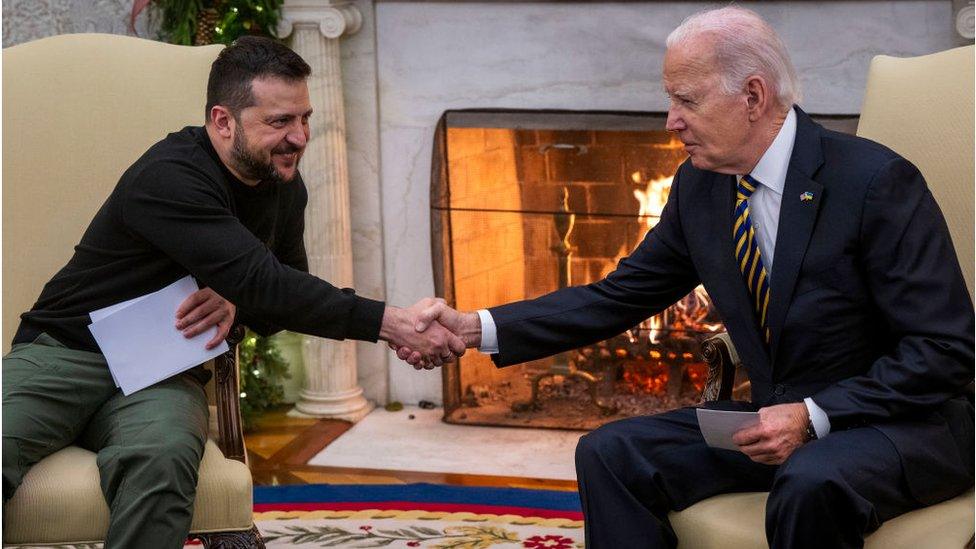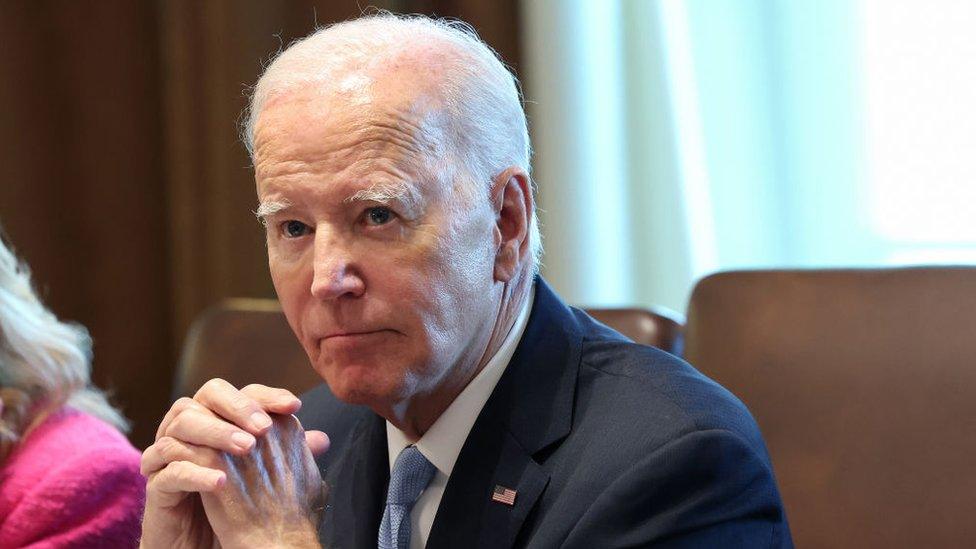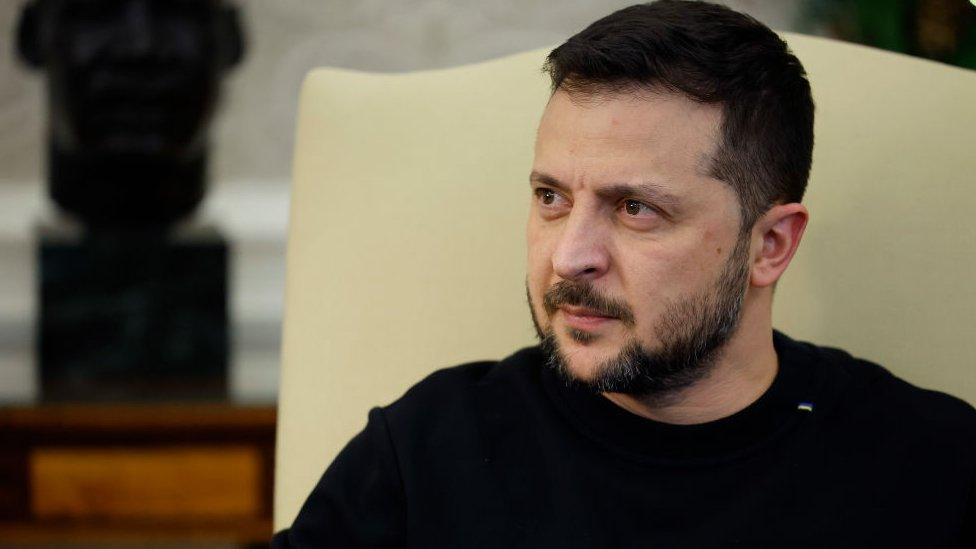Biden risks Democrats' fury over deal on border and Ukraine
- Published

Joe Biden is caught in a dilemma with no good options - to get what he wants, the US president may have to reward his political enemies while angering his allies. That's an uncomfortable position ahead of an election year.
This week began with Ukrainian President Volodymyr Zelensky visiting Washington to plead for more US military aid from Congress.
It ended with Mr Biden and Senate Democrats considering just how far they would be willing to bend in order to fulfil his wish - and just how angry they would be willing to make members of their own party in the process.
Republicans are setting conditions for more Ukraine aid - included in a $100bn (£82bn) package that also contains support for Israel and Taiwan - that begin and end with immigration.
That includes not just more money for border security, but also significant changes to the way in which undocumented migrants at the US-Mexico border seeking asylum protections are processed.
Among the measures under consideration are raising the bar for migrants to qualify for asylum consideration in the US and making it easier to deport undocumented entrants without a hearing when border-crossings surge.
The Biden administration reportedly wants to preserve the president's flexibility to provide exceptions to these rules.
The White House would not comment on what hard-line Republican options might be on the table. It is clear, however, exactly how angry some Democrats on the left would be if Mr Biden agreed to such changes.
"I thought I entered a time machine back to the Trump era," Democratic Senator Bob Menendez of New Jersey said at a Congressional Hispanic Caucus rally on the steps of the US Capitol.
"I could not comprehend how a Democratic president who vehemently countered Trump's policies as a candidate is seriously putting forward the most Trumpian anti-immigrant proposal."

Activists urge the White House to reject Republican proposals for the border
Other legislators condemned the negotiations as a Republican trap and expressed outrage that liberal legislators and Hispanic politicians were left out of the closed-door meetings.
They said the Biden administration would never consider bargaining away other liberal priorities like abortion freedoms, education or civil rights in exchange for a one-time foreign aid bill.
Why, they asked, was immigration different?
Public opinion polling provides a clue. While Democrats have majorities on their side for many of their political priorities, a recent Wall Street Journal poll indicated that 64% of Americans disapproved of Mr Biden's handling of border security.
And by a 54% to 24% margin, respondents said Donald Trump, not Mr Biden, was "best able" to secure the border.
Beto O'Rourke, who once represented the Texas border town of El Paso in Congress and ran for the Democratic presidential nomination in 2019, tells BBC's Americast that Mr Biden needs to reclaim the moral high ground in the immigration debate.
He wants the president to point out what he says was the cruelty of the Trump-era policies Republicans want to enshrine into law.
Watch: Zelensky faces political deadlock in Washington DC
"We have not heard that recently from Joe Biden," he said. "And we're not seeing that right now in his policies. But I believe he'll do the right thing."
Mr O'Rourke knows first-hand how hard an issue immigration can be for Democrats.
Last year, he tried to defeat Texas Republican Governor Greg Abbott by running a campaign that emphasised abortion rights and gun control, among other issues. The governor focused like a laser on immigration - and ended up winning by almost 11%.
"If the president and his administration are not able to offer a comprehensive vision and strategy and demonstrate that they have control over the challenges on the border, it opens the field to Donald Trump on a national level," Mr O'Rourke said.
Members of the House of Representatives have already left Washington for the winter holidays, but senators will be back next week to try to hammer out a deal that includes Ukraine aid and immigration reform.
It's a hint of progress for the administration - and the opportunity to achieve a foreign policy goal while, perhaps, addressing a political weakness that has bedevilled Mr Biden.
The potential risk of alienating liberal allies whose faith in the president has been strained by the ongoing war between Israel and Gaza as well as concessions during budget negotiations earlier this year is high, however.
"For Biden, we're invisible," Congressman Luis Gutierrez of Illinois said at the Capitol on Wednesday.
"They don't do any outreach. They don't do any consultation." And that, he continued, would have electoral consequences.
"Latinos won't come out to vote," he said. "And our efforts to knock on their doors to canvass and to get them out to vote will only become increasingly more difficult."
The president is caught in a bind. What happens next week will help determine how - or if - he can find a way out.
- Published14 December 2023

- Published13 December 2023
